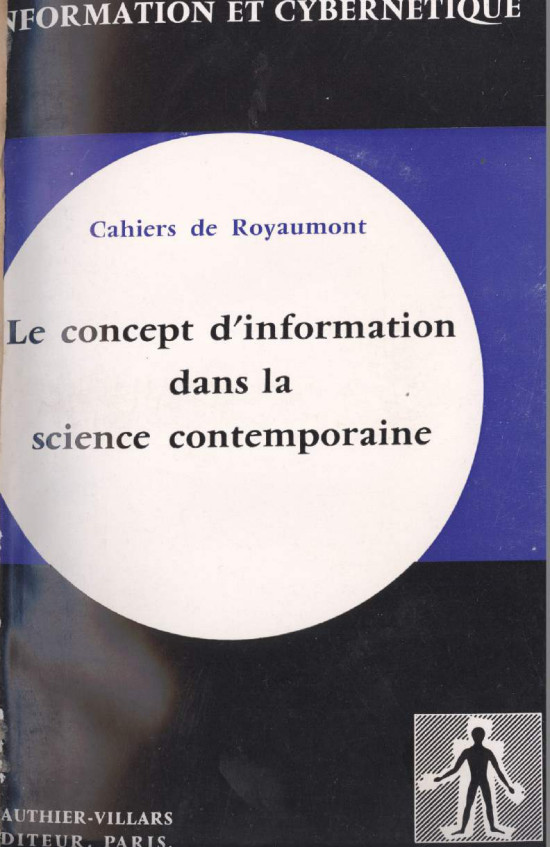Le concept d’information dans la science contemporaine (1965) [French]
Filed under proceedings | Tags: · communication, computing, cybernetics, information, information theory, machine, mathematics, philosophy, science

“The proceedings from the Sixth Symposium at Royaumont in 1962 were titled Le concept d’information dans la science contemporaine [The Concept of Information in Contemporary Science] and were published three years later in Paris by Les Éditions de Minuit.
In attendance were Gilbert Simondon, Norbert Wiener, Martial Gueroult, Giorgio de Santillana, Lucien Goldmann, Benoit Mandelbrot, René de Possel, Jean Hyppolite, André Michel Lwoff, Abraham Moles, Ferdinand Alquié, Henryk Greniewski, Helmar Frank, Jiri Zeman, François Bonsack, Louis Couffignal, Albert Perez, Maurice de Gandillac, Ladislav Tondl, Gilles-Gaston Granger, and Stanislas Bellert, among others.
Simondon was a very active organizer and introduced Wiener. The collection is fascinating for a number of reasons; most striking, perhaps, is the fact that a prominent Marxist (Goldmann) and a brilliant mathematician (Mandelbrot) were given equal opportunity to talk philosophically about the concept of information. Mathematicians like Mandelbrot and Wiener were given the same stage as philosophers like Simondon and Hyppolite.
Some of the papers are pretty scientific, but most of them are not. What you get is a collection of papers given and discussed (the Q & As are included and are revealing) by some of the individuals who heavily influenced Deleuze and a number of other French philosophers. This is an incredibly revealing volume and I will eventually work hard to translate some of the papers that are included.
Simondon’s paper, ‘L’Amplification dans les processus d’information’, was not included in the proceedings (only the abstract is provided at the very end of the book, along with the topic of Wiener’s response to Simondon), but was published and is available in the collection of his papers titled Communication and Information: Courses and Conferences (La Transparence, 2010).” (from a blog post by Andrew Iliadis)
Publisher Les Éditions de Minuit, Paris, 1965
425 pages
via Andrew Iliadis, HT babyalanturing
Review: D. Gabor (The British Journal for the Philosophy of Science, 1966, EN).
PDF (36 MB, updated on 2021-3-28)
multiple formats (Internet Archive)
Hillel Schwartz: The Culture of the Copy: Striking Likenesses, Unreasonable Facsimiles, 2nd ed. (1996/2013)
Filed under book | Tags: · animal, appropriation, art, children, computing, copy, death, fashion, film, gender, genetics, history, imitation, japan, language, machine, memory, music, photography, piracy, property, reenactment, reproduction, sculpture, simulation, slavery, statistics, surgery, technology, theatre, time, war

The Culture of the Copy is an unprecedented attempt to make sense of the Western fascination with replicas, duplicates, and twins. In a work that is breathtaking in its synthetic and critical achievements, Hillel Schwartz charts the repercussions of our entanglement with copies of all kinds, whose presence alternately sustains and overwhelms us. Through intriguing, and at times humorous, historical analysis and case studies in contemporary culture, Schwartz investigates a stunning array of simulacra—counterfeits, decoys, mannequins, and portraits; ditto marks, genetic cloning, war games, and camouflage; instant replays, digital imaging, parrots, and photocopies; wax museums, apes, and art forgeries, not to mention the very notion of the Real McCoy. Working through a range of theories on biological, mechanical, and electronic reproduction, Schwartz questions the modern esteem for authenticity and uniqueness. The Culture of the Copy shows how the ethical dilemmas central to so many fields of endeavor have become inseparable from our pursuit of copies—of the natural world, of our own creations, indeed of our very selves.
This updated edition takes notice of recent shifts in thought with regard to such issues as biological cloning, conjoined twins, copyright, digital reproduction, and multiple personality disorder. At once abbreviated and refined, it will be of interest to anyone concerned with proglems of authenticity, identity, and originality.
First published in 1996
Publisher Zone Books, New York, 2013
ISBN 1935408453, 9781935408451
480 pages
Review (Terence Hawkes, London Review of Books, 1997)
Review (Francis Kane, The New York Times, 1997)
Review (Todd Gitlin, Los Angeles Times, 1997)
Download (removed on 2014-3-20 upon request of the publisher)
Comment (1)Geoffrey Winthrop-Young: Kittler and the Media (2011)
Filed under book | Tags: · alphabet, biography, computing, cultural techniques, discourse, language, media, media technology, media theory, philosophy, technology

“With books such as Discourse Networks and Gramophone, Film, Typewriter and the collection Literature, Media, Information Systems, Friedrich Kittler has established himself as one of the world’s most influential media theorists. He is also one of the most controversial and misunderstood.
Kittler and the Media offers students of media theory an introduction to Kittler’s basic ideas. Following an introduction that situates Kittler’s work against the tumultuous background of German 20th-century history (from the Second World War and the cultural upheaval of the late 1960s to reunification), the book provides succinct summaries of Kittler’s early discourse-analytical work inspired by French post-structuralism, his media-related theorising and his most recent writings on cultural techniques and the notation systems of Ancient Greece.
This clear and engaging overview of a fascinating theorist will be welcomed by students and scholars alike of media, communication and cultural studies.”
Publisher Polity, 2011
Theory and Media series
ISBN 0745644066, 9780745644066
165 pages
PDF (updated on 2019-12-8)
Comments (6)
